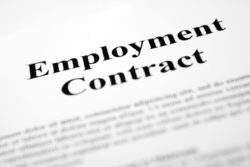 Overseas employees of defense and military contractors may be receiving misinformation from their employers regarding their tax status in relation to the Foreign Earned Income Exclusion and other tax laws. According to many current and former military contractor employees, their employers and the IRS have also pressured them into signing away their tax rights and may have illegally shared and distributed their tax return information.
Overseas employees of defense and military contractors may be receiving misinformation from their employers regarding their tax status in relation to the Foreign Earned Income Exclusion and other tax laws. According to many current and former military contractor employees, their employers and the IRS have also pressured them into signing away their tax rights and may have illegally shared and distributed their tax return information.
Are Employees at Foreign-Based U.S. Defense Sites Eligible for the FEIE?
According to employees at the United State’s Pine Gap facility in Australia, many workers have been forced to sign closing agreements stating that they are not eligible to claim the Foreign Earned Income Exception. Despite these employees claiming that they were pressured into signing these contracts under duress, or after the start of their employment on foreign soil, the IRS claims that these agreements are legally binding. However, the IRS has tried to enforce these kinds of closing agreements in the past and has failed.
Pine Gap and U.S.-Australia Tax Treaties
Pine Gap is an important United States intelligence facility located in Australia. Utilizing the 38 satellite dishes located on the site, the CIA and NSA collect a variety of intelligence regarding ballistic missiles, nuclear weapons, and battlefield intelligence.
In 1966, the United States and Australia signed the “Agreement between the Government of the Commonwealth of Australia and the Government of the United States of America relating to the Establishment of a Joint Defense Space Research Facility.”
Under this 1966 treaty, American workers who live in Australia for the purpose of working at the facility are not considered to be Australian residents, and are still considered to be U.S. employees for tax purposes.
According to the original agreement, Australia agreed to waive its right to tax wages earned at Pine Gap if the U.S. employees did not claim the Foreign Earned Income Exclusion when they filed their taxes with the United States.
However, a new agreement was signed between the countries in 1982. This agreement, the “Convention Between the Government of the United States of America and the Government of Australia for the Avoidance of Double Taxation and the Prevention of Fiscal Evasion with Respect to Taxes on Income,” made several changes to the original treaty. Under the 1982 Treaty, the tax status of Pine Gap and other overseas employees was changed to allow them to claim the FEIE.
Although the 1982 treaty specifically mentions employees of defense contractors working on behalf of the U.S. Government while located in another country, there have been years of debate over whether the terms of the 1966 Treaty or the 1982 Treaty are meant to apply to overseas workers.
Multiple court rulings by the U.S. Court of Appeals for the D.C. Circuit and the Supreme Court have ruled that the most recent treaty is the one that must be followed. Despite these rulings, employees at Pine Gap and other U.S. sites on foreign soil claim that their employers have pressured them not to take the FEIE. Additionally, some employees claim that they have also been pressured to disclose their tax information to their employers.
Taxpayer Privacy Laws
U.S. federal law protects your tax return information from disclosure to other parties. According to IRC Section 6103, IRS employees are generally prohibited from releasing your tax information to another party.
There are a few exceptions to this tax privacy law. Your tax information may be shared with state agencies responsible for tax administration, and it may also be released to law enforcement agencies if it is court ordered. Additionally, your tax information may be shared with the Social Security Administration. However, there are no exceptions allowing employers who want to ensure you are abiding by closing agreements to access your taxpayer information.
Pine Gap FEIE Class Action Lawsuit
According to a class action lawsuit lodged by a group of Pine Gap workers, employees were told that they would be taxed to the fullest degree if they attempted to claim the FEIE on their taxes. The class action lawsuit against Northrup Grumman, AECOM, General Dynamics, and Raytheon Company also claims that an IRS agent illegally disclosed their taxpayer information to Pine Gap HR.
Attorneys working with named plaintiff Scott Meredith contacted the accused IRS agent, Melanie Godelis, to issue a warning against contacting the plaintiffs in the class action lawsuit. Following this warning, Godelis and Pine Gap officials pressured employees to sign retroactive consent forms regarding the release of their taxpayer information.
According to the plaintiffs, they were told if they did not sign the forms they would no longer be allowed to work in Australia, or they would begin to be taxed at rate of 45 percent.
About FEIE Eligibility
Employees of overseas defense contractors who may qualify for the Foreign Earned Income Exclusion must still meet several requirements, including the bona fide resident test, or the physical presence test.
Under the bona fide resident test, U.S. citizens must reside in a foreign country for an uninterrupted period that includes an entire tax year, from January to December.
In order to pass the physical presence test, U.S. citizens or resident aliens must be physically present in a foreign country for a minimum of 330 full days during a twelve month consecutive period. Under this test, full days are defined as 24 hours.
What Counts as Foreign Earned Income?
Foreign earned income is income received for services performed in a foreign country, including wages, salaries, or professional fees. In some cases, non-cash income, allowances, and reimbursements may also be considered income. Property, facilities, lodging, meals, or vehicles may qualify as earned income, as well as relocation fees, including reimbursements for nondeductible moving expenses.
If this income is collected during a period where your tax home is also a foreign country, you may qualify for the FEIE. Income not eligible for the FEIE include pension or annuity payments, social security benefits, or pay received as an employee of the U.S. Government.
If you have worked as a U.S. military or defense contractor employee in a foreign country, you may qualify for the Foreign Earned Income Exclusion on your taxes, regardless of what your employer has told you regarding your tax status, or whether you have signed a closing agreement.
If you work or worked at Pine Gap or another military installation for a defense contractor overseas and you were prevented from claiming the Foreign Earned Income Exclusion, you may have overpaid your taxes.
In addition, if you were compelled to sign a Closing Agreement, a Consent to Disclose, and/or a Declaration, waiving your privacy rights as a taxpayer, the tax attorneys working with Top Class Actions can help you.
They can help you understand your rights and how to obtain the money you are owed from the IRS.
Learn more by filling out the short form on this page.
This article is not legal advice. It is presented
for informational purposes only.
ATTORNEY ADVERTISING
Top Class Actions is a Proud Member of the American Bar Association
LEGAL INFORMATION IS NOT LEGAL ADVICE
Top Class Actions Legal Statement
©2008 – 2026 Top Class Actions® LLC
Various Trademarks held by their respective owners
This website is not intended for viewing or usage by European Union citizens.
Get Help – It’s Free
Join a Free Defense Contractor Tax Overpayment Lawsuit Investigation
If you qualify, an attorney will contact you to discuss the details of your potential case at no charge to you.
PLEASE NOTE: If you want to participate in this investigation, it is imperative that you reply to the law firm if they call or email you. Failing to do so may result in you not getting signed up as a client or getting you dropped as a client.
E-mail any problems with this form to:
[email protected].
Oops! We could not locate your form.












